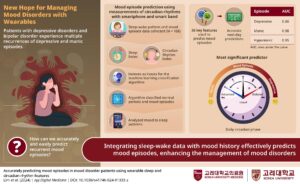
Feb 19, 2025: Patients with mood disorders experience recurrences of depressive and manic episodes throughout their lives. In this regard, researchers from the Korea University College of Medicine have come up with a novel prediction algorithm that effectively forecasts future episodes with high accuracy by leveraging sleep-wake data collected using a smartphone and smart band. This could help patients with mood disorders prevent such recurrences by adjusting their lifestyle habits.
Irregular sleep and lifestyle habits can disrupt the body’s circadian rhythm, which encompasses the physical, mental, and behavioral changes experienced by an individual within a 24-hour cycle. These disruptions can contribute to depressive and manic episodes. While individuals may not easily discern disruptions in their circadian rhythm, patients with depressive disorders and bipolar disorder unfortunately experience recurrent depressive and manic episodes throughout their lives. This makes predicting these episodes in advance a significant challenge.
Wearable devices offer a promising solution by facilitating the passive collection of circadian rhythm indicators, including sleep, heart rate, and step-count data. This data can be leveraged for mood episode prediction in patients with mood disorders. However, current machine learning-based prediction models often necessitate various data types, hindering their practical application in real-world settings.
Researchers, led by Heon-Jeong Lee, a professor of psychiatry at Korea University College of Medicine and the university’s Vice-President of Research Affairs, demonstrated in a new prospective observational cohort study (ClinicalTrials.gov: NCT03088657, 2017-3-23) that simple measurements of circadian rhythms using a smartphone and a smart band can predict the recurrence of mood episodes. This work was done in collaboration with Professor Jae Kyung Kim’s team at KAIST, Korea. Their groundbreaking work was published in npj Digital Medicine on November 18, 2024.
They propose a novel algorithm that predicts future depressive and manic episodes using only sleep-wake data collected easily using smartphones and wearables. Notably, it is also trained using the sleep-wake history and prior mood episodes of a person. The team collected longitudinal data from 168 patients and identified 36 sleep and circadian rhythm features through mathematical modeling. Among them, daily circadian phase shift was found to be the most significant predictor, with delays associated with depressive episodes and advances to manic episodes. “We found that the features helped effectively predict depressive, manic, and hypomanic episodes for the next day, with the respective area under the curve values of the XGBoost machine learning model being 0.80, 0.98, and 0.95,” according to Prof. Heon-Jeong Lee.
This study demonstrates that sleep-wake data, combined with past mood episode history, can accurately predict mood episodes in individuals. Consequently, patients with mood disorders can receive early insights into their condition, enabling them to manage their habits and potentially prevent the recurrence of depressive and manic episodes.
Prof. Lee envisions future applications of this research: “Our findings could lead to the development of digital therapeutics that help individuals become aware of changes in their circadian rhythm, enabling them to adjust their routines and mitigate mood episodes.”
